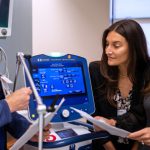Armed with a Frontline Innovation grant from The Beckwith Institute, Dr. Joy Gero, program director in the General Adult and Behavioral Health ICU at UPMC Western Psychiatric Hospital, and other experts from across UPMC are working to ensure that when a lesbian, gay, bisexual, transgender or questioning (LGBTQ) person seeks care at a UPMC facility, that person is treated with dignity and respect, always.
Gero’s team includes Dr. Kristen Eckstrand from Child and Adolescent Psychiatry at UPMC Western Psychiatric and Dan Lavallee, director of Government and Business Relations at UPMC Health Plan. Together, they’re leading the work to get all UPMC hospitals ranked on the Human Rights Campaign’s (HRC) Healthcare Equality Index (HEI). UPMC Children’s Hospital of Pittsburgh and UPMC Western Psychiatric have appeared in the index previously. This year, they will be joined by additional UPMC business units.
To be a named HEI leader, there is an annual application process that assesses how hospitals meet specific requirements in staff training, patient services, employee benefits and policies, patient engagement, and responsible citizenship.
 “The HEI integrates different pieces of a complicated system,” Eckstrand said. “It looks across patient care, organizational climate and clinical training to determine the key pieces that need to be prioritized for LGBTQ individuals and how health care systems are doing in that regard.”
“The HEI integrates different pieces of a complicated system,” Eckstrand said. “It looks across patient care, organizational climate and clinical training to determine the key pieces that need to be prioritized for LGBTQ individuals and how health care systems are doing in that regard.”
The HEI is also used as a tool to help health care systems evaluate if their processes are properly serving this community.
“It allows the organization to say, ‘Here are some things we have already in place. How would this look when we’re working with the LGBTQ community?’” Gero added.
The answer is a complex mix of operational abilities and the cultural knowledge of staff on the front lines. These two factors often collide when it comes to sex assigned at birth and gender identity.
“Right now in electronic health records at UPMC, we do not have a way of coding sex and gender identity as two different things,” Gero said. “Because we also don’t have a way of recording a person’s chosen name in addition to their legal name, sometimes health care workers may say things like, ‘Well, Jill, I understand you want to be called Jim, but we have to call you what your record says.’”
The respectful option is to refer to the patient in the way they choose to identify. Even in situations where the patient’s legal name needs to be verified, like when giving a blood transfusion or during a surgical time out, this can be performed in ways that respect individuals whose chosen name is not their legal name.
Not using a patient’s chosen name or pronouns can leave an individual feeling disrespected and devalued by the health care system, even if the error was an honest mistake by staff. One of the beneficial aspects of applying for the HEI is that it provides insights into how we can improve our existing processes, along with suggestions for what else we could do to support the LGBTQ community.
The HEI also is a publicly accessible document. To Eckstrand, this is just one more benefit of the report.
“We want to show the LGBTQ community what we have to offer,” she said. “We want to be transparent so that we can say what we’re good at and where we can improve. Then we can quantify our improvements and demonstrate our commitment to quality care.”
 “We want everyone to come to us and not be afraid to talk about their feedback,” Lavallee added. “The more of our hospitals that are leaders in providing inclusive patient care for the LGBTQ community, the better it is for all of our members.”
“We want everyone to come to us and not be afraid to talk about their feedback,” Lavallee added. “The more of our hospitals that are leaders in providing inclusive patient care for the LGBTQ community, the better it is for all of our members.”
Becoming Equality Leaders
Applying for the HEI is time-consuming, and the process to educate staff more so.
“We could have just sent an email or a PDF guide,” Eckstrand said. “We ultimately decided to hold regional trainings for staff, so our hospitals know they’re not alone in navigating these issues.”
A team of trainers, including Dr. Gina Sequiera, Dr. Gerald Montano and social worker Eli Nitzberg, plans to bring this training to Erie, Harrisburg, Pittsburgh and Williamsport.
During four-hour sessions, leadership from nursing, patient experience, human resources and management learn everything they need to know to be successful in the HEI process. They discuss the ins and outs of the application, and examine cultural factors, like how to talk through the resistance of learning, what to many is a new language, to communicate respectfully with the LGBTQ community.
The trainings, however, are just the beginning.
“The work we’re doing with the Frontline Innovation grant is the starting point of integrated communication across the whole system,” Eckstrand said. “We will also use this time to hear from all the hospitals outside of Pittsburgh about the resources they’re using and how we can better connect people to resources in their region.”
By setting up this conversation to continue past the HEI application, the group hopes to establish champions at each facility. The group will then work with the champions to continue to improve care for the LGBTQ community.
“This grant is really serving as a springboard for our future work,” Eckstrand added.
To the Front Lines and Beyond
This project was one of 14 selected as a Frontline Innovation last year. With the grant, UPMC staff can receive up to $20,000 to fund an idea that positively impacts patient care.
“The name of the grant says it all — it’s about innovation,” Eckstrand said. “The grant has helped us focus on what’s innovative and distilling an idea into a feasible topic we can invest on the front lines.”
Lavallee agreed.
“To have this program is so powerful,” he said. “It shows a commitment from UPMC and The Beckwith Institute board.”









